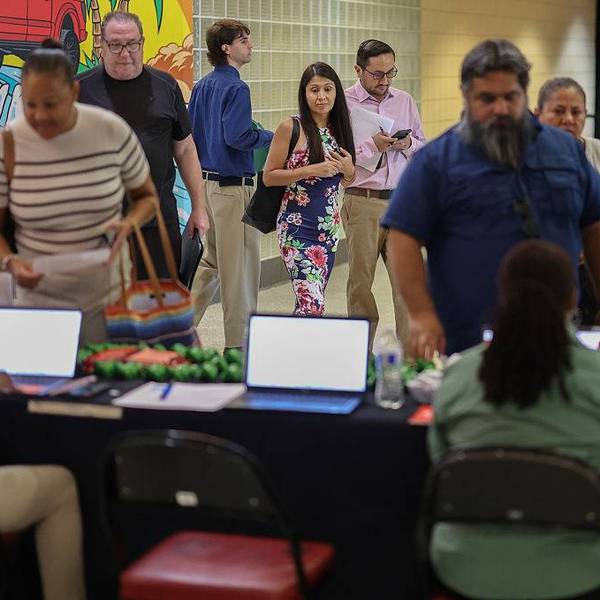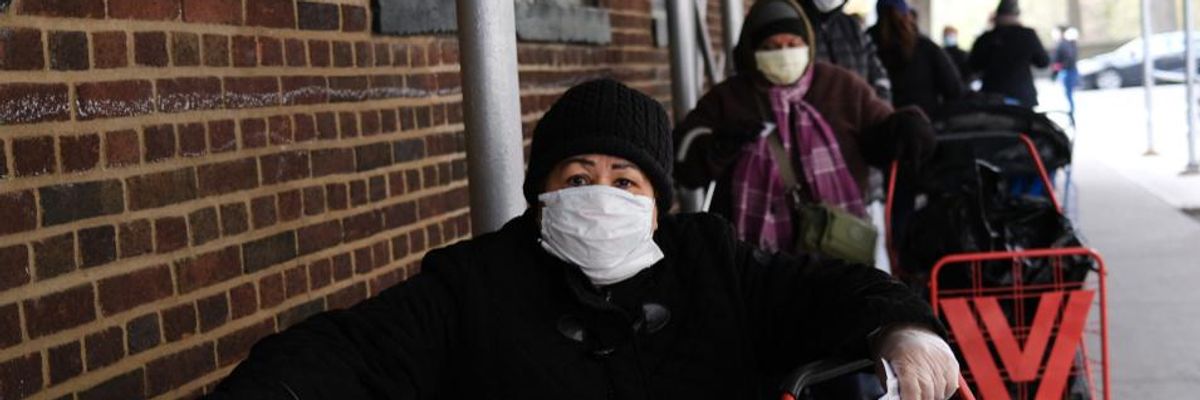Economists and progressive lawmakers on Thursday pointed to new unemployment numbers as the latest evidence that Congress must pass bold legislation to give direct financial assistance to Americans--allowing them to stay at home to help stop the spread of Covid-19 while scientists search for a vaccine and treatment, while being able to pay for essentials.
The Labor Department reported that 3.2 million more Americans filed for unemployment benefits last week, bringing total jobless claims amid the outbreak to an estimated 33.5 million.
According to the department, the unemployment rate in the U.S. is now 15.5%, but some economists, including Elise Gould of the Economic Policy Institute (EPI), say that 20% of workers may actually be out of a job, with possibly 20% of workers out of a job but yet to file for unemployment.
"If all the workers who filed for unemployment insurance up to and including the reference week (April 12-18 in the claims data) were counted in the measured unemployment numbers, the unemployment rate could hit 18% in the latest jobs day release," wrote Gould, a senior economist at EPI.
"Of course," she added, "this fails to count the workers who were unable to file or lost their jobs and were ineligible for unemployment insurance. The CARES Act provisions that greatly expanded eligibility for unemployment insurance were only operational in most states in the last couple of weeks. Taken together, this could suggest an unemployment rate in excess of 20%, levels last seen in the Great Depression."
Many workers who stop working as a result of the Covid-19 pandemic may never be counted as unemployed, wrote Gould's colleague, EPI policy director Heidi Shierholz.
These workers "will be counted as dropping out of the labor force instead of as unemployed because they are unable to search for work due to the lockdown, or because they are not available to work because they are, for example, caring for children whose school has closed," Shierholz wrote.
Additionally, noted journalist Lance Lambert at Fortune on Thursday, the explosion in unemployment claims since mid-March, when businesses across the country were forced to shut down to help stop the spread of Covid-19, more than seven million Americans were already unemployed at that time.
"When those figures are combined, it equals more than 40 million unemployed, or a real unemployment rate of 24.9%," wrote Lambert.
During the Great Depression, the highest unemployment rate recorded was 25.6% in May 1933.
Jobless claims in the last week did recede slightly, dropping by about 677,000. But Oxford Economics economists Nancy Vanden Houten and Gregory Daco cautioned against viewing this reduction as a sign of a recovery soon.
"While initial claims for unemployment benefits continue to slowly recede from their peaks, they remain at painfully high levels," wrote Vanden Houten and Daco.
In light of the new numbers, Rep. Pramila Jayapal (D-Wash.) and Sen. Bernie Sanders (I-Vt.) highlighted legislation they have put forward in recent weeks to make sure Americans continue receiving their paychecks for the duration of the crisis.
Jayapal's Paycheck Guarantee Act would allow both large and small businesses to continue paying their employees' salaries of up to $100,000, and would disincentivize layoffs and furloughs.
The Paycheck Security Act, put forward by Sanders along with Sens. Richard Blumenthal (D-Conn.), Doug Jones (D-Ala.), and Mark Warner (D-Va.), would cover the wages and benefits of all employees whose companies have been affected by the pandemic.
Sen. Ed Markey (D-Mass.) called on Congress to pass a People's Bailout, which would provide economic relief directly to people rather than through business loans or unemployment benefits and would expand the existing Medicare system to cover all Americans.
At EPI, Shierholz wrote that the current unemployment rate--with nearly one in five workers out of a job--was "previously unimaginable" and "is nearly five times the worst seven-week stretch of the Great Recession."
"The Congressional Budget Office projects that without additional relief, the unemployment rate will average 16% in the third quarter of this year and 10.1% for the entire calendar year of 2021. The relief and recovery packages passed so far have not been big enough to deal with the scale of this crisis, and more aid is critical," wrote Shierholz. "The next federal relief and recovery package should make substantial additional investments in unemployment compensation."
"The next package should also include substantial aid to state and local governments, worker protections, paycheck protections, investments in our democracy, relief for the postal service, and significant investments in testing and contact tracing so that, in the absence of a vaccine or effective treatment, we have a chance of being able to reopen the economy successfully," she added.




